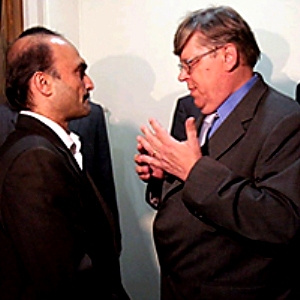Heinonen to visit Tehran; IAEA continues to probe Iran's nuclear program
IAEA Deputy Director General will visit Tehran this week to discuss alleged studies

Iran's Ambassador to IAEA, Ali Asghar Soltanieh said on April 19th that Olli Heinonen, Deputy Director General of IAEA, will visit Tehran. According to Soltanieh, Heinonen will be in Tehran on Monday and Sunday this week. Heinonen will be accompanied by Director for Safeguards Operations, Herman Nackaerts.
This became definite after being announced by Melissa Fleming, IAEA spokeswoman. Fleming added that Heinonen will meet Iranian officials and discuss the so-called alleged studies.
It seems that despite the delay in meeting between Aghazadeh, president of the Atomic Energy Organization of Iran, and Muhammad ElBaradei, IAEA officials haven't halted their probing on Iran's nuclear activities and regardless of the setbacks of cooperation, run to their schedule.
Heinonen created diplomatic controversy in February, talking about the connections between Iran's uranium processing projects, its remote explosive testing and casting and machining of uranium metal into the shape of warheads. These issues are probably on agenda in Heinonen's trip to Tehran and he will talk with the Iranian officials on the alleged studies.
On the other hand, although Iran has always rejected these allegations and insisted that its nuclear program is peaceful, IAEA closely eyes Iran's activities to ensure reports on its nuclear activities match with facts and to ask for convincing explanations.
The Iranian officials have always regarded talks and interactions with IAEA as constructive. They start that it was Iran who initiated a new round of negotiations to resolve ambiguities about its nuclear program. Iranian officials don't miss any chance to remind that IAEA is the ultimate authority entitled to investigate and decide on Iran's nuclear activities and the UN Security Council intervention is baseless.
As to the upcoming visit of Heinonen, Soltanieh mentioned this as a sign of Iran's policy to continue its cooperation with UN nuclear watchdog. Also in his weekly press briefing, Mohammad Ali Hosseini, Foreign Ministry Spokesman remarked that Heinonen's visit takes place within the framework of Iran-IAEA cooperation. Hosseini stated that Iran has presented to IAEA its evaluation about the alleged studies and the Iran-IAEA framework of cooperation is clear. According to Hosseini the Islamic Republic of Iran follows no secret plans and all nuclear activities are monitored by International Atomic Energy Agency.
In resolution 1803, the UN Security Council had urged Iran to halt its uranium enrichment program, claiming that the resolution was passed due to concerns over the future of Iran's nuclear program. The resolution was approved with 14 votes in favor and one vote of abstention by Indonesia. It took place just 10 days after the release of ElBaradei's report, and one year after the previous resolution on Iran's nuclear program.
The important point about resolution 1803 is that it is not binding and mostly intended to fuel the atmosphere of crisis created around the nature of Iran's nuclear activities. Definitely the resolution was passed as a result of international developments from March 2007 to March 2008. Any other sanction resolution passed against Iran will have the same reason and due to rising international concerns.
Probably Iran's reluctance to continue negotiations with IAEA are caused after previous cooperation proved to be unsuccessful in stopping approval of the third sanction resolution. But we shouldn't forget that in the current circumstances, when the international atmosphere is not in favor of Iran and its nuclear activities and achievements, and to stop things getting worse, contacts and talks with IAEA as a legitimate authority must be welcomed. Any delay will pave the way for measures against Iran's national interests.

